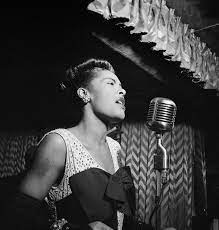The Story of Baltimore’s Own: Billie Holiday

Billie Holiday (Google images)
Born Eleanora Fagan on April 7, 1915, in Baltimore, Maryland, Billie Holiday would soon be known as one of the best jazz vocalists ever.
Holiday spent much of her childhood in Baltimore. Holiday had a somewhat stable home life. Being raised by a mostly single mother, she faced many struggles and became independent due to her mother’s absence.
In her difficult early life, Holiday found solace in music, singing along to the records of Bessie Smith and Louis Armstrong. She followed her mother, who had moved to New York City in the late 1920s and worked in a house of prostitution in Harlem for a time.
Around 1930, Holiday began singing in local clubs and renamed herself “Billie” after the film star Billie Dove. Holiday’s career truly took off in 1933, when writer and producer John Hammond discovered her singing at a New York club called Monette’s.
As her reputation grew, Billie Holiday performed with mainstream acts like ‘Count Basie’ and his renowned orchestra in 1937 and ‘Artie Shaw and his big band orchestra in 1938.
In 1939, she began an engagement with Caf Society, a nightclub in Greenwich Village, and it was around this time that she recorded her famous song about the lynching of African-Americans, “Strange Fruit.” This song would soon be known as her most famous song. Strange Fruit, written by Lewus Allan (Abel Meeropol), differed from holiday’s normal lovey-dove songs. It quickly became an anthem of the anti-lynching movement and the first significant song of the then-fledging Civil Rights Movement. The song forced listeners to confront the brutality of the mass lynching taking place in the deep south.
By the end of the 1940s, Billie Holiday was considered a famous jazz star, being voted the best jazz vocalist in Esquire magazine reader’s poll, and appearing in the 1946 film New Orleans with Louis Armstrong and Kid Ory. During this time, widely popular songs such as God Bless the Child, Gloomy Sunday, All of Me and Them There Eyes would be released.
After the death of her mother, Holiday fell into a pattern of repeated arrests due to drug and substance abuse. By 1950, the authorities denied her a license to perform in establishments selling alcohol. Though she continued to record and perform afterward, this marked a major turning point in her career. For the next seven years, Holiday would slip deeper into alcoholism and begin to lose control of her once-perfect voice. In 1959, after the death of her good friend Lester Young and with almost nothing to her name, Billie Holiday died at the age of forty-four. \
During her lifetime she had fought racism and sexism, and in the face of great personal difficulties triumphed through a deep artistic spirit. It is a tragedy that only after her death could a society who had so often held her down, realize that in her voice could be heard the true voice of the times.
Your donation will support the student journalists of Parkdale High School. Your contribution will allow us to cover our annual website hosting costs and publish some printed editions, as well.

Richard Potts is currently a senior at Parkdale High (2023 last GOATed). Even though they have been on staff since 2020, he finally has a staff profile!...







Jennifer • Apr 7, 2025 at 9:01 pm
Hello. I am seeing many citations that Billie Holiday was born in Philadelphia.